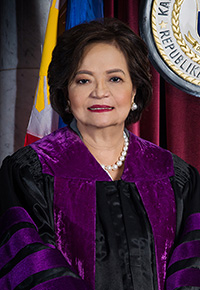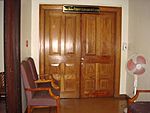Teresita de Castro facts for kids
Quick facts for kids
Teresita de Castro
|
|
|---|---|
 |
|
| 24th Chief Justice of the Supreme Court of the Philippines | |
| In office August 28, 2018 – October 10, 2018 |
|
| Appointed by | Rodrigo Duterte |
| Preceded by | Maria Lourdes Sereno (De facto) Renato Corona (De jure) |
| Succeeded by | Lucas Bersamin |
| 160th Associate Justice of the Supreme Court of the Philippines | |
| In office December 3, 2007 – August 28, 2018 |
|
| Appointed by | Gloria Macapagal Arroyo |
| Preceded by | Cancio Garcia |
| Succeeded by | Rosmari Carandang |
| 4th Presiding Justice of the Sandiganbayan | |
| In office September 8, 1997 – December 3, 2007 |
|
| Appointed by | Fidel V. Ramos |
| Preceded by | Romulo Quimbo |
| Succeeded by | Ediberto Sandoval (acting) |
| Personal details | |
| Born |
Teresita Jose Leonardo
October 10, 1948 Manila, Philippines |
| Spouse | Eduardo de Castro |
| Children | 3 |
| Alma mater | University of the Philippines (AB, LLB) |
Teresita Leonardo de Castro (born Teresita Jose Leonardo on October 10, 1948) is a Filipina who became the 24th Chief Justice of the Supreme Court of the Philippines. She was chosen by President Rodrigo Duterte on August 28, 2018. She took over the position after the previous Chief Justice, Maria Lourdes Sereno, was removed from office.
De Castro officially retired on October 10, 2018, when she turned 70 years old. This was the required retirement age for judges. She served as Chief Justice for only 46 days, which was a very short time. Before becoming Chief Justice, she was a Justice of the Supreme Court. She also served as the Presiding Justice of the Sandiganbayan, which is a special court that handles cases involving government officials.
Contents
About Teresita de Castro
Teresita de Castro's parents are Fortunato R. Leonardo and Maxima Jose. She lives in Parañaque, Philippines. She is married to Eduardo A. De Castro, a businessman, and they have three children: Maria Cherell, Christine Genevive, and Edouard Anthony.
Her Education and Early Career
De Castro finished her elementary school in 1960 and high school in 1964. She was the top student in her high school class. She then studied political science at the University of the Philippines and graduated with honors in 1968. She also earned her law degree from the same university in 1972. She passed the Philippine Bar Examination in November 1972.
She began her career in the legal field as a law clerk at the Supreme Court of the Philippines from 1973 to 1978. Later, she worked for the Department of Justice (DOJ) in various roles, including State Counsel and head of the Legal Staff. Before she was appointed to the Sandiganbayan, she was a senior legal official at the DOJ.
De Castro was the Presiding Justice and led the First Division of the Sandiganbayan when she was appointed to the Supreme Court. She also served as the President of the International Association of Women Judges from 2012 to 2014. In 2015, she was the Chairwoman of the committee for the Philippine Bar Examination.
Important Court Cases
Teresita de Castro was involved in several important court cases during her career.
The Trial of Joseph Estrada
De Castro led a special division of the Sandiganbayan court that handled the trial of former President Joseph Estrada. This trial involved serious charges against him. The trial ended in September 2007. Estrada was found guilty of some charges and given a serious sentence. Other people involved in the case, including Estrada's son, Senator Jinggoy Estrada, were found not guilty.
After the decision, former President Estrada disagreed with the court's ruling. President Gloria Macapagal Arroyo said that the court's decision should be accepted. Soon after this important trial, De Castro was appointed to the Supreme Court. Some people suggested that her appointment was connected to the trial's outcome. However, she strongly denied these claims, stating that she had been considered for a Supreme Court position even before the case.
Becoming a Supreme Court Justice

On October 16, 2007, the Judicial and Bar Council (JBC) announced the final candidates for a vacant seat on the Supreme Court. Teresita de Castro was among those chosen. According to Philippine law, the President has 90 days to pick someone from the list of candidates.
Senator Jinggoy Estrada, the son of former President Joseph Estrada, said he would try to stop De Castro's appointment. He felt that her promotion seemed like a reward for the guilty verdict against his father. He believed the special court was set up to find his father guilty.
Chief Justice Reynato S. Puno officially swore in De Castro on December 4, 2007. De Castro said that she believed her many years of service in the judiciary made her qualified for the position. She immediately started working in her new role.
Public Reactions to Her Appointment
- Former President Joseph Estrada called De Castro's appointment a "reward for an unjust conviction" against him.
- Senator Francis Pangilinan questioned her appointment because she was close to retirement. He felt it did not help strengthen the rule of law.
- Some legal experts suggested that her appointment might be seen as the President's way of showing appreciation.
- Minority Leader Aquilino Pimentel, Jr. said that it was the President's decision and he did not question it.
- On December 4, 2007, Senate President Manuel Villar and Senate President Pro-Tempore Jinggoy Estrada also questioned the timing of her appointment. They felt it gave the impression that it was a reward for the Estrada case.
- Senator Richard Gordon stated that De Castro was highly qualified for the Supreme Court. He said her appointment should not be seen as a "reward" because the former president had already been granted a pardon.
- Executive Secretary Eduardo Ermita defended De Castro's appointment. He noted that she had been nominated for the position several times before but was bypassed because she was still handling the Estrada case. He added that she deserved the appointment.
Her Role in a Case Against the Previous Chief Justice
De Castro was one of five sitting justices who wanted to cancel the appointment of Maria Lourdes Sereno as the country's top judge. De Castro and Sereno were both considered for the Chief Justice position in 2012, but then-President Benigno Aquino III chose Sereno. De Castro and four other justices were accused of trying to remove the Chief Justice from office.
Chief Justice of the Supreme Court
On August 25, 2018, President Rodrigo Duterte appointed De Castro as the Chief Justice of the Supreme Court of the Philippines. This happened after Maria Lourdes Sereno was removed from the position. De Castro served for 46 days until her mandatory retirement on her 70th birthday on October 10. Her appointment was discussed because of her very short term and her role in the case against the previous Chief Justice.
Education and Qualifications Summary
- She earned her Bachelor of Arts in Political Science (with honors) and Bachelor of Laws from the University of the Philippines Diliman.
- She was a member of several honor societies, including Phi Kappa Phi and Pi Gamma Mu.
- She held leadership roles in legal organizations, such as the Philippine Women Judges Association.
Images for kids
See also
- Supreme Court of the Philippines
- Trial of Joseph Estrada
 | Percy Lavon Julian |
 | Katherine Johnson |
 | George Washington Carver |
 | Annie Easley |



